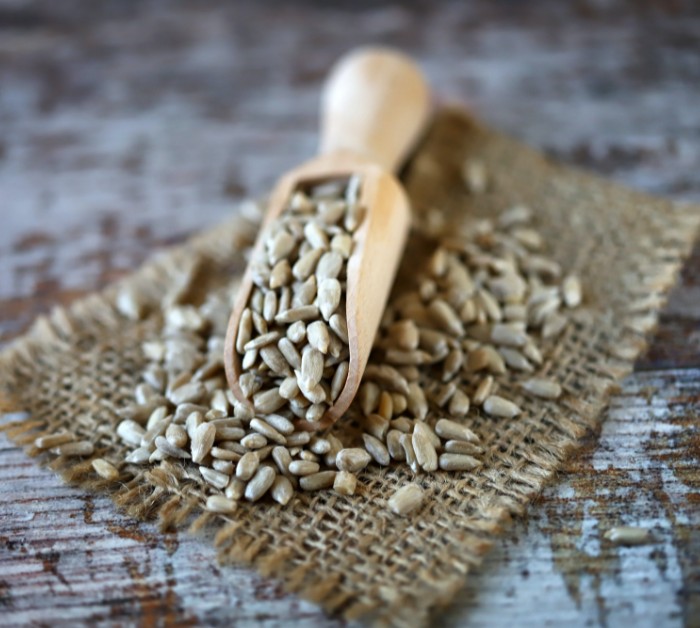Sunflower seeds: Benefits, potential side effects, and tips for eating them
Sunflower seeds are probably part of your diet and you consume these super healthy seeds while watching TV, sport, or on a break. But do you know that you can add these edible seeds to your meals and that sunflower seeds are super healthy if you consume them in moderation?
Here in this article, we will present to you why sunflower seeds are so good for you, what happens when you eat too many and how to incorporate these seeds into your daily diet.
Before we start let’s see some interesting facts about sunflowers:
- Each sunflower can contain as many as 1,000 to 2,000 seeds
- David Der Hairabedian in 1926 first roasted sunflower seeds in his grocery store and packed them in individual servings for a nickel
- The French word for sunflower is tournesol which translates literally to “turned sun”
- The tallest sunflower ever recorded was grown in Germany and measured 30 feet, 1 inch
This post may contain affiliate links, which means we may receive a small commission, at no cost to you, if you make a purchase through a link. For more information, please see our disclosure.
What are sunflower seeds?
Sunflower seeds come from the head of the sunflower plant Helianthus annuus. This Latin’s scientific name of sunflowers reflects its solar appearance helios is the Greek word for sun, and anthos is the Greek word for flower.
The plant’s flower heads can measure more than 12 inches in diameter, and each sunflower can have as many as 2,000 seeds.
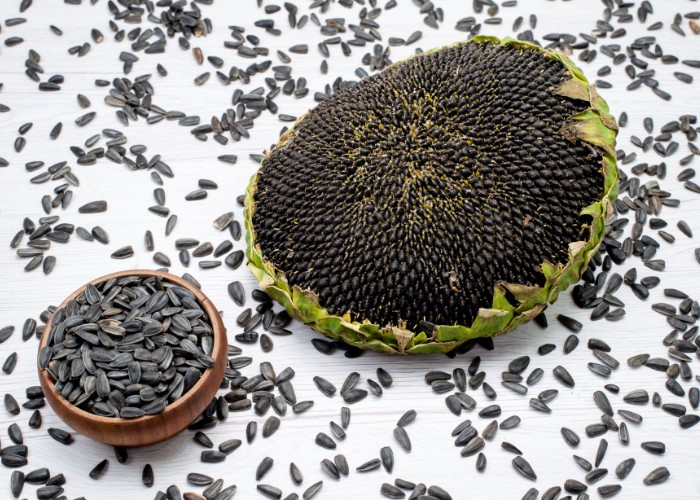
The seed itself is white and is encased in a black and white striped shell, also called a hull. These are edible seeds, while the other type used for extracting sunflower oil have solid black shells.
The sunflower seeds you eat have a mild, nutty flavor and a firm but tender texture. You can eat the seeds raw, roasted to enhance the flavor, or incorporated into other dishes.
Sunflowers are one of the first plants to ever be cultivated in the United States. They have been used by Native Americans, who used the seeds as a food and oil source, but also used the roots, flowers, and stems for different purposes including as a dye pigment.
The plant made its way to Europe by Spanish explorers who subsequently introduced it to other neighboring countries.
Now when we know what are sunflower seeds it’s time to find out more about their nutritional value and why these edible seeds are so healthy!
Sunflower seeds nutrition facts
Here is the nutritional information for 1 ounce ( 28 grams or 1/4 cup ) of dry roasted sunflower seeds kernels without salt:
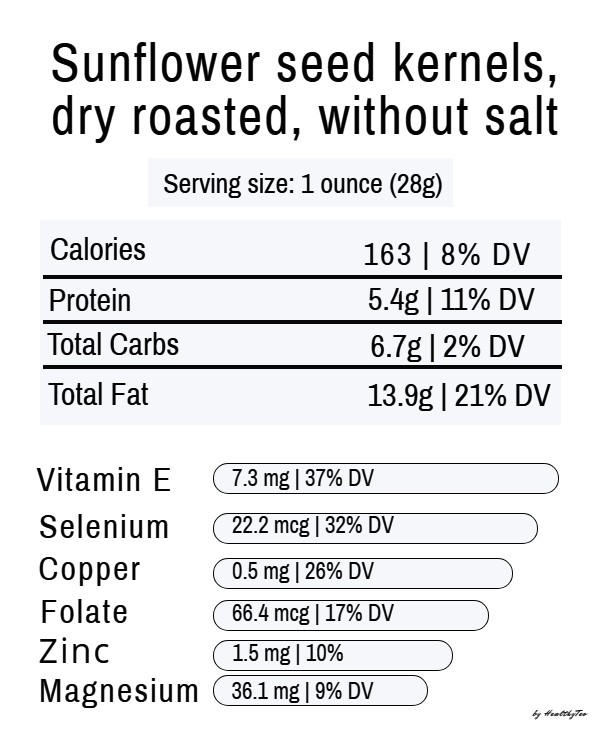
As we can see from the table above sunflower seeds are rich in protein and healthy fats that are very good for you and we will show why in the next section when we talk about the benefits of sunflower seeds.
According to these nutritional facts, one serving ( 1/4 cup or 1 ounce ) of sunflower seeds contains 5.4 grams of protein or 11% of DV. These proteins are valuable for many biological processes including muscular and skeletal development.
Sunflower seeds are especially rich in vitamin E and selenium which function as antioxidants that protect your body from free radicals. They have a higher amount than linseed, sesame seeds, and peanuts. Additionally, they are a good source of phenolic acids and beneficial plant compounds which also function as antioxidants.
Sunflower seeds are almost negligent in sodium on their own, but packed sunflower seeds are loaded with salt and some brands may contain up to 79% of your sodium limit per serving! Keep in mind that shells are often coated in salt, if you are watching your salt intake look for unsalted sunflower seeds and moderate your portions.
Are sunflower seeds good for you?
From the section about the nutritional value of sunflower seeds, we can see that these seeds are a great source of vitamin E, magnesium, fatty acids, and several plant compounds.
These components are responsible for the health benefits of sunflower seeds. A handful of sunflower seeds will take care of your hunger, while also enhance your health.
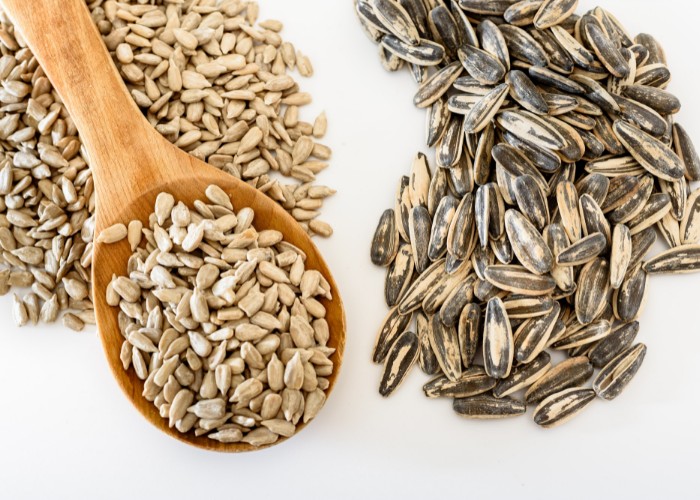
Here we will present to you why sunflower seeds are so healthy and all of this is supported by scientific research.
Anti-inflammatory benefits
Today you hear a lot about chia and hemp seeds – trendy seeds that can offer anti-inflammatory benefits. But consumption of sunflower seeds is also related to a reduced risk for several chronic diseases. Chronic inflammation is a risk factor for many chronic diseases.
Increased blood levels of the inflammatory marker C-protein are linked to an increased risk of type 2 diabetes and heart disease. The results of a study published in the American Journal of Epidemiology conducted on more than 6,000 participants, showed that those who reported eating sunflower seeds and other seeds at least 5 times a week had 32% lower levels of C-reactive protein compared to those who ate no seeds.
Furthermore, sunflower seeds are an excellent source of vitamin E, the body’s primary fat-soluble antioxidant. Vitamin E neutralizes free radicals which otherwise damage fat-containing molecules and structures such as cell membranes, brain cells…
By protecting these molecular and cellular components vitamin E has significant anti-inflammatory effects. Flavonoids and other plant compounds also help reduce inflammation.
Cholesterol-lowering effects
Sunflower seeds are rich in unsaturated fatty acids especially linoleic acid. Linoleic acid is used by our bodies to make a hormone-like compound that relaxes blood vessels, promoting lower blood pressure. This acid also helps lower cholesterol.
A study was conducted in 2019 and published in the Asian Journal of Pharmaceutical and Clinical Research with a goal to analyze and assess the effects of sunflower seeds on serum cholesterol and low-density lipoprotein (LDL) levels.
The study concluded that sunflower seeds can be used as an adjuvant in treating the raised cholesterol and LDL levels in the blood serum.
Boosting energy levels
High levels of protein in sunflower seeds help boost your energy levels and other nutrients like vitamin B and selenium can help you keep energized.
Selenium can increase blood flow and deliver more oxygen to your body. Thiamin ( vitamin B1 ) present in these seeds can help you convert food to energy, which can keep you active throughout the day.
Diabetes – Are sunflower seeds good for diabetics?
This question is so common when it comes to the benefits of sunflower seeds. Well, there are some studies on the effects of sunflower seeds blood sugar and type 2 diabetes and the results are promising, but more research is needed.
According to current studies eating one ounce ( 30 grams ) daily of sunflower seeds may reduce fasting blood sugar by 10% within six months. This happens basically to the plant compound chlorogenic acid.
Also, adding sunflower seeds to bread or other foods may help decrease carbs’ effect on blood sugar. Protein and fat present in these seeds slow the rate at which your stomach empties, allowing a more gradual release of sugar from carbs.
Help to prevent and fight sickness
Sunflower seeds are an excellent source of essential vitamins and minerals that can support your immune system. These include both selenium and zinc.
Selenium plays a role in fighting inflammation and infection, along with boosting immunity.
Zinc is an integral part of the immune system, as it helps both to develop and maintain the proper function of immune cells. Also, zinc functions as an antioxidant to fight free radicals.
Can eating too many sunflower seeds be dangerous?
Sunflower seeds are a healthy snack when eaten in moderation. But like anything in life moderation is the key. Eating too much, even healthy food like sunflower seeds can lead to unwanted effects like excess sodium and cadmium intake.
Sodium
Some kinds of sunflower seeds are salted during processing. If you’re watching your salt intake, be aware that the shells – which people usually suck on before cracking them open, are often coated with sodium.
According to USDA’s National Nutrient Database 1 ounce of toasted salted sunflower seeds, kernels provide 174 milligrams of sodium.
The American Heart Association recommends people eat less than 1,500 milligrams of sodium per day to prevent high blood pressure and cardiovascular diseases.
One ounce of salted sunflower seeds provides 12% of that limit which makes them an acceptable snack if you don’t eat too much of them.
Cadmium
Cadmium is a heavy metal that that can harm your kidneys if you are exposed to a high amount over a long period. Sunflowers tend to take up cadmium from the soil and deposit it in their seeds.
The WHO recommends a weekly limit of 490 micrograms of cadmium for a 154-pound ( 70 kg ) adult.
So if you eat 255 grams ( 9 ounces ) sunflower seeds weekly for one year period your average cadmium intake will increase from 65 mcg to 175 mcg per week. This amount doesn’t raise the blood levels of cadmium.
If you eat a reasonable amount of sunflower seeds like 1 ounce ( 30 grams ) per day you can reap all the benefits and you shouldn’t be concerned about any side effects.
Sprouted sunflower seeds and bacteria
Sometimes sunflower seeds may contain harmful bacteria such as Salmonella, and this often happens if a person grows them or buys sprouted seeds from a grocery store.
This often happens in raw sprouted seeds which may not have been heated above 118 F ( 48 C ). Drying sunflower seeds at higher temperatures helps destroy harmful bacteria.
Allergies
According to the American Academy of Allergy Asthma & Immunology, different types of seeds may be allergic and cross-reactions. This means that if you have a known allergy to poppy seeds you may also experience a reaction to sunflower seeds.
So, if you have a seeds allergy or you suspect an allergy to sunflower seeds, speak to your doctor for personalized advice.
Unwanted weight gain
Eating too much of any food can cause weight gain and this often is a result of eating more calories than your body burns. When your body can’t use the consumed calories it stores them as fat.
According to the 2015-2020 Dietary Guidelines, your calorie intake should range from 2,000 to 3,000 calories per day for adult men and 1,600 to 2,400 calories per day for adult women.
So, are sunflower seeds fattening? – One ounce serving of toasted sunflower seed kernels without salt provides 163 calories which are just about 10% of a typical daily intake of 2,000 calories. If you eat five times that amount you could be getting as much as 875 calories in one sitting.
Consuming too many sunflower seeds can lead to excess calorie intake and weight gain, but eating in moderation is perfectly fine.
Summing Up – Eating sunflower seeds in moderation is good for your health, but consuming too much of these seeds can lead to unwanted effects.
How many sunflower seeds to eat daily?
It is recommended to stick to a standard serving of the seeds which is 1 ounce ( 28 grams ) or about 1/4 cup daily to avoid potential side effects.
Tips for eating
You can eat sunflower seeds raw or dry roast them in the oven or on the stovetop. If you eat sunflower seed kernels for a quick snack, measure out the seeds instead of just reaching into a bag or bowl.
Try to keep your portion to no more than 1/4 cup ( without the shell ) which is equal approximately to a single dry ounce.
Eating shelled sunflower seeds requires you to crack them open with your teeth and spit out the shell which shouldn’t be eaten.
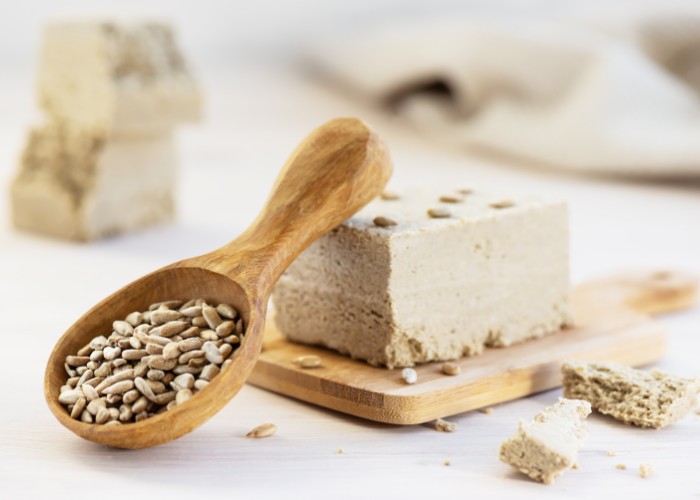
To reap all the benefits from sunflower seeds you can also add them to a variety of dishes. Here are some ways to incorporate sunflower seeds into your meals:
- Garnish green salads with sunflower seeds
- Add sunflower seeds to your chicken, turkey, or tuna salad recipe
- Add them in baking bread or muffins
- Add to veggie burgers
- Use sunflower butter in place of peanut butter
- Use fine ground sunflower seeds to dust your meats with in place of flour
Important to know when adding sunflower seeds into your meals: If you’re paring your seeds with a serving of fruit try cutting your portion in half to control calories. When you are adding these seeds to your vegetable-packed salad or side dish, you should keep your portion to about 1 tablespoon.
To roast them place the kernels on a baking sheet and place them in a 400-degree oven. Drizzle with a small amount of olive oil and seasoning if you prefer. Keep an eye on them as they will start to brown in 3-4 minutes.
How long do sunflower seeds last?
Sunflower seeds are either sold unshelled or shelled and are generally available in prepackaged containers as well as bulk bins. Since they have high-fat content and are prone to rancidity, it’s best to store them in an airtight container in the refrigerator. You can also store them in the freezer since the cold temperature will not affect their flavor or texture.
When properly stored the shelf life of sunflower seeds beyond the best date is approximate:
- Raw sunflower seeds last for 2-3 months; in a freezer 1 year
- Roasted Shelled last for 3-4 months; in a freezer 1 year
- Roasted In-Shell last for 4-5 months; in a freezer 1 year
How to tell if sunflower seeds are bad, spoiled, or rotten? The best way is by smell, they will start to smell rancid because of the natural oils breaking down due to their exposure to oxygen.
Common questions and answers
Q: Are sunflower seeds keto?
A: Sunflower seeds are 100% keto-friendly due to their low carb content, only 6.7 grams per 1 ounce. Unless you eat 300 grams or 10 servings of these seeds in a sitting there are zero risks they will kick you out of ketosis.
Q: Can dogs eat sunflower seeds?
A: Yes, dogs can eat sunflower seeds without any problem. When sunflower seeds are fed to dogs in an appropriate amount they can boost your dog’s health because they are rich in vitamins and minerals.
Q: Are sunflower seeds nuts?
A: Sunflower seeds are not nuts. This is a common question and leaves many people with nut allergies wondering if they can enjoy sunflower seeds. You may be able to eat these seeds but if you are allergic to nuts it’s good to consult with your doctor first before trying sunflower seeds.
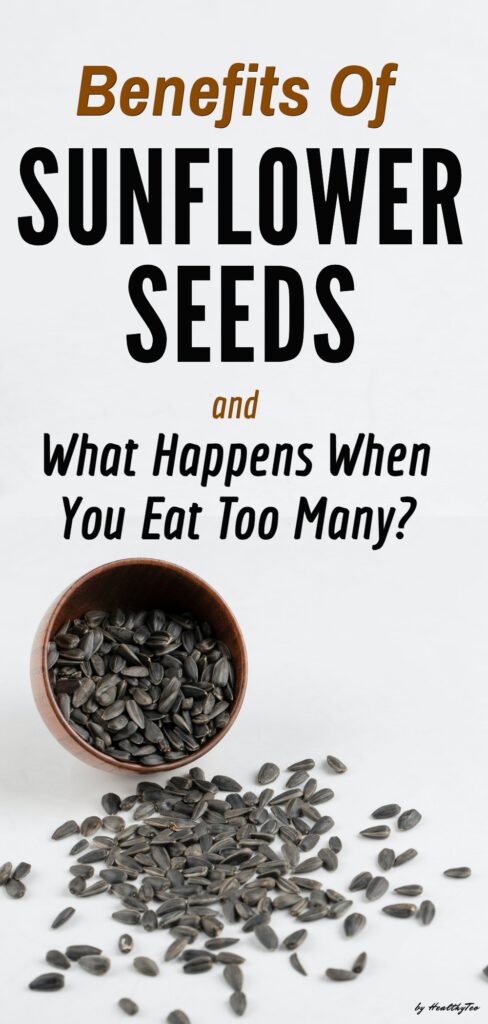
Benefits and potential side effects of sunflower seeds – final thoughts
Sunflower seeds are super healthy edible seeds that you should add to your daily diet. They are keto-friendly and a great snack. The best thing is that you can eat them raw and to reap all the benefits you need to eat just a 1/4 cup or 1 ounce daily. Still, you need to remember that they are calorie-dense and you may experience unwanted effects if you eat too many.
Even they are tasty and crunchy snacks don’t eat too much like every food moderation is the key. Rich in essential nutrients, beneficial plant compounds they have anti-inflammatory and antioxidant properties. This is a super healthy food that you should add to your diet.
Some people may be allergic to sunflower seeds, so if you are allergic to nuts or other seeds consult with your doctor before adding sunflower seeds to your daily meals!
Related articles:
Different Types Of Edible Seeds That You Should Add Into Your Diet

